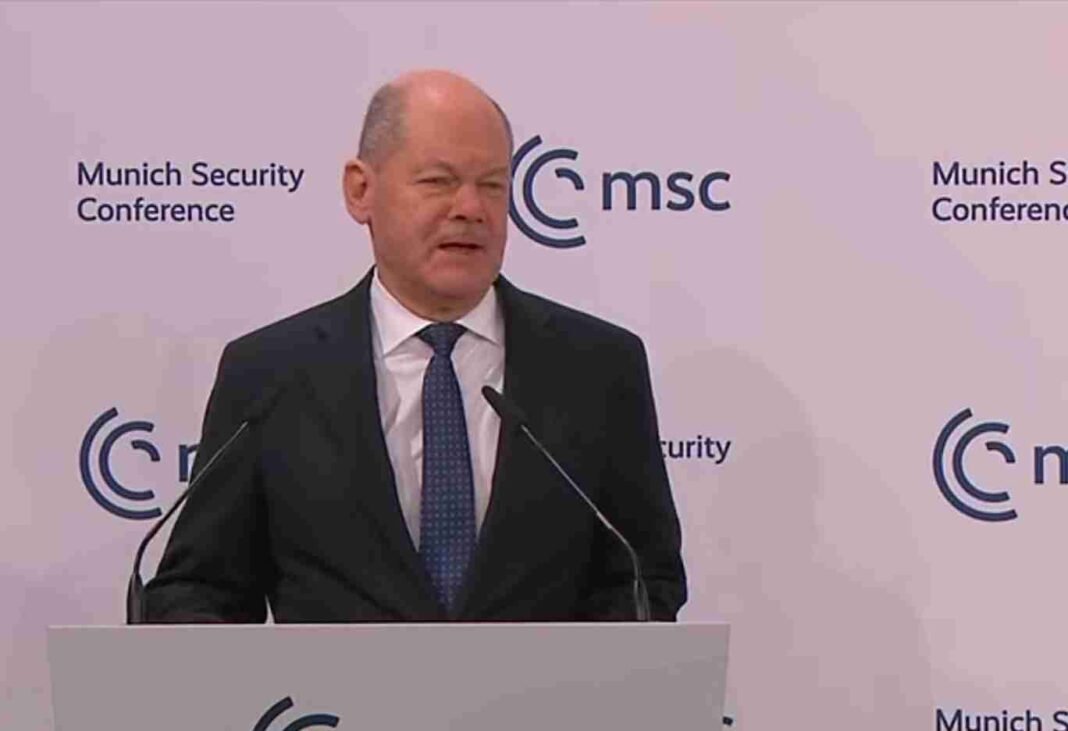At the Munich Security Conference, German Chancellor Olaf Scholz delivered a pointed rebuttal to Vice President JD Vance’s controversial remarks regarding European democracy and free speech. Vance’s speech, which took place a day earlier, accused European leaders of suppressing ‘free speech’ and failing to engage with rising far-right parties, a claim that Scholz vehemently contested.
Olaf Scholz’s remarks were a direct response to Vance’s assertion that free speech is “in retreat” across Europe. The Chancellor criticized what he described as “outsiders intervening in our democracy,” particularly from allies, and underscored the need for a unified front among Germany’s democratic parties to counter the influence of extreme right-wing factions.
He reiterated that Germany’s laws on hate speech are designed to protect individuals from attacks that violate these regulations, stating, “Free speech in Europe means that you are not attacking others in ways that are against legislation and laws we have in our country.”
Speaking on Saturday, Chancellor Scholz emphasized the importance of protecting Germany’s democratic values, particularly in light of the country’s historical commitment to preventing the rise of fascism and the atrocities of the Holocaust.
He stated, “Our commitment to ‘never again’ cannot be reconciled with support for the Alternative for Germany (AfD),” referring to the far-right party that has gained traction in recent years, partly due to backing from influential figures like billionaire Elon Musk.
The tension between JD Vance and Olaf Scholz was further highlighted by German Defense Minister Boris Pistorius, who labeled Vance’s comments as “unacceptable.” Pistorius accused the Vice President of drawing inappropriate comparisons between Europe and authoritarian regimes, reinforcing the notion that Vance’s views do not align with the values upheld by Germany’s democratic institutions.
JD Vance’s speech, which came just days before Germany’s upcoming election on February 23, raised eyebrows among European leaders. He claimed that the concerns of the populace are being dismissed, warning that “democracy will not survive if their people’s concerns are deemed invalid.”
He criticized what he termed “old entrenched interests” that use terms like “misinformation” and “disinformation” to justify censorship, suggesting that such tactics undermine the democratic process.
One of the examples JD Vance cited was the arrest of a man in the United Kingdom for praying near an abortion clinic, a case that has sparked debate over free speech and protest rights.
However, the individual in question had violated a legal buffer zone designed to protect women from harassment, a detail that Vance’s critics argue undermines his broader point about free speech suppression.
During his time in Munich, US VP JD Vance reportedly met with Alice Weidel, the leader of the AfD and the party’s candidate for chancellor in the upcoming election.
The AfD has been a source of controversy in Germany, with its leaders facing accusations of promoting inflammatory rhetoric reminiscent of Nazi ideology. Some party members have made statements that have drawn public outrage, including comments suggesting that not all Nazi leaders should be considered criminals.
As the AfD continues to gain support, polling indicates that the party is poised for a significant electoral performance, currently holding a solid second place behind the Christian Democratic Union and Christian Social Union coalition. This rise has raised concerns among mainstream political parties about the potential normalization of far-right ideologies in German politics.
Olaf Scholz’s defense of Germany’s democratic principles and his rejection of Vance’s claims reflect a broader struggle within Europe regarding the balance between free speech and the protection of democratic values.
As the political landscape shifts, the implications of these debates will likely resonate beyond the Munich Security Conference, influencing the upcoming election and the future of European democracy.








